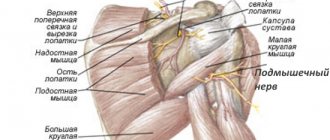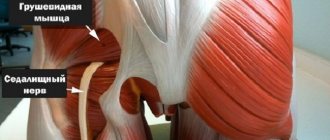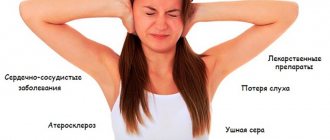What does dizziness indicate when you lie on your back?
Regular back pain, dizziness when lying down, weakness in the limbs - all these symptoms cannot go unnoticed at any age, as they can be caused by serious diseases of the spine, internal organs or cardiovascular system.
If you experience any of these unpleasant sensations, you should immediately consult a doctor for an accurate diagnosis and professional treatment.
Let's look at the main causes of dizziness when lying on your back, as well as accompanying painful sensations.
Norm and pathology
It is quite normal to experience dizziness, for example, after a carousel or other spin, a sudden change in body position, or when a person looks down from a great height.
In such cases, the vestibular system and vision may become temporarily unbalanced, which leads to such sensations.
But if a person experiences dizziness while lying on his back while resting or sleeping, this indicates that the body has undergone unfavorable changes. During attacks you may experience the following sensations:
- strong feeling of anxiety, restlessness;
- state similar to intoxication;
- a feeling that the ceiling and walls are approaching, falling, and all objects in the room begin to float;
- headache and nausea, a feeling of body rotation - all this does not go away even during sleep;
- pain in various parts of the back, burning in the spine, numbness of the limbs.
When changing body position, these sensations may intensify. During the day a person may feel weak.
Why is my head spinning?
Doctors identify the main causes of dizziness when a person lies on his back:
- Vestibular neuritis. The head begins to feel dizzy suddenly, which may lead to vomiting. Often the attack occurs immediately after sleep.
- Hypotension. With low blood pressure, the brain does not receive enough blood and nutrients. The inner ear contains fluid, which is also affected by pressure. It helps maintain balance and normal body position, but if the pressure is reduced, the fluid incorrectly changes its position, which misleads the brain.
- Brain tumors and inflammation. In this case, in addition to dizziness, hearing impairment occurs.
- Vegetovascular dystonia. Decreased vascular tone contributes to insufficient blood supply to the temporal lobes of the brain, where the main part of the vestibular apparatus is located.
- Inflammation of the nose, pharynx, inner or outer ear. Excess fluid and mucus formed during inflammatory processes put pressure on neighboring organs. This can cause dizziness that a person will experience even while lying on their back.
- Diabetes. Low blood sugar and increased blood pressure negatively affect the vestibular system.
- Various long and strict diets, side effects from medications.
Dizziness that accompanies back pain requires special consideration. Most often, the cause of this is a disease of the spine.
Osteochondrosis
This disease occurs when the nutrition of the intervertebral discs is disrupted, which leads to a loss of their elasticity and a change in size. The discs serve as shock absorbers and distribute pressure evenly between the vertebrae.
When the core of the intervertebral disc loses its fluid, the shock-absorbing function is disrupted and osteochondrosis occurs.
The causes of this disease can be injuries, age-related changes, as well as a person’s genetic predisposition. The disease can begin to develop at a young age, from about 20 years of age.
Weakness in the arms, legs, back, goose bumps, headache and dizziness can be signs of osteochondrosis. By the presence of certain symptoms, you can determine which part of the spine is affected by the disease.
If the cervical spine is injured, the following are observed:
- tinnitus, headache, dizziness;
- shooting pain in the neck that can radiate to other parts of the body;
- “goosebumps” and weak sensitivity in the neck, arms, fingers;
- heart pain;
- loss of consciousness with sudden turns of the head.
If the disease affects the thoracic region, the following are noted:
With lumbar osteochondrosis, a person feels:
- “goosebumps” in the legs, legs feel like cotton wool;
- acute pain in the lumbar region;
- in severe cases – urinary and fecal incontinence.
These are only the main symptoms of this spinal disease, and the longer the disease develops, the more widespread and noticeable they appear.
If, for example, a person has a burning sensation in the back and feels dizzy, this may mean that osteochondrosis has led to the formation of intervertebral hernias.
Anatomical explanation
So, we found out that osteochondrosis of the cervical and upper thoracic spine can cause dizziness. Let's take a closer look at why you still feel dizzy.
There is a double vessel in the spine that branches off from the subclavian artery. Passing through the holes in the cervical vertebrae, it enters the skull through the back of the head, supplying blood to the cerebellum and posterior parts of the brain, as well as the tissues adjacent to it.
Because blood flow in the affected spine is impaired, the brain receives less blood than it needs. This causes oxygen starvation and subsequent dizziness.
During physical activity, such as backstroke, dizziness may worsen. This is due to the fact that the limbs require more blood for active movements, which they “take” from the brain.
What to do
You can provide temporary help to yourself in the following ways:
- Ventilate the room, remove clothing that restricts movement or squeezes the body.
- Massage your head, neck and face - this will improve blood circulation.
- Breathe slowly and deeply through your mouth with your stomach, placing your right hand on it. 5 to 7 minutes of this breathing exercise will help relieve an attack.
- Look at an immovable object with your hand on it. After a few seconds, the vestibular system can return to normal.
- Measure and normalize blood pressure if necessary.
Don't delay and go to the doctor. If you feel dizzy and have back pain, a neurologist will likely help you.
If there are no unpleasant sensations in the back, then consult an ENT specialist and an endocrinologist. If you can’t figure out who to go to, visit a therapist, and he will refer you for further examination.
If you want to get more information like this from Alexandra Bonina, check out the materials on the links below.
Denial of responsibility
The information in the articles is for general information purposes only and should not be used for self-diagnosis of health problems or for therapeutic purposes. This article is not a substitute for medical advice from a doctor (neurologist, therapist). Please consult your doctor first to know the exact cause of your health problem.
I will be very grateful if you click on one of the buttons and share this material with your friends











